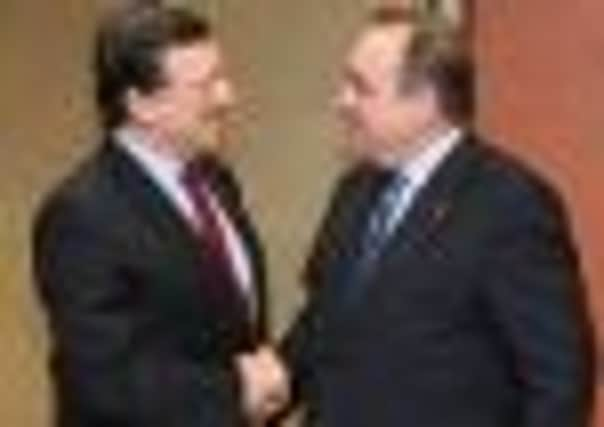SNP has changed its tune over EU, claim opponents


At the end of a week that saw the SNP’s plans to join the EU subjected to yet more scrutiny, opposition parties claimed that the Scottish Government had altered its stance.
This week it emerged that European officials had signalled that a newly independent nation would have to reapply for EU membership.
Advertisement
Hide AdAdvertisement
Hide AdJose Manuel Barroso, president of the European Commission, confirmed that if a territory became independent from an EU member country, existing treaties would “cease to apply” after independence and if the new state wanted to join the EU then it would have to apply in the normal manner.
Yesterday Patricia Ferguson, Labour’s constitution spokeswoman, claimed that since the commission’s view had become known, there had been a shift in the SNP’s position.
“The SNP have been telling the people of Scotland for years that EU membership wouldn’t be an issue and anybody who suggested differently was just scaremongering,” Ms Ferguson said.
“After weeks of turmoil on the EU, Alex Salmond and his government seem to have shifted their position and arrived at the conclusion many of us reached some time ago – that at best this is uncertain, and at worst an independent Scotland would have to join the euro and set up border controls with the rest of the United Kingdom.”
Jackson Carlaw, deputy leader of the Conservatives, said: “First Alex Salmond asserts that EU membership is automatic. Then [Deputy First Minister Nicola] Sturgeon asserts that all Europe will be falling over themselves to keep us in.
“Now, John Swinney says it will all be subject to negotiation. The conduct of SNP ministers has been farcical on this most important of issues throughout.”
Earlier this week, Mr Barroso said he stood by the commission’s view, given in 2004, that declared that a newly independent nation within the EU would “become a third country with respect to the union”. “Third country” is a technical term denoting a state outside the EU.
Mr Salmond’s critics claimed that the position outlined by Mr Barroso was at odds with the SNP’s claim that Scotland would automatically join the EU after independence.
Advertisement
Hide AdAdvertisement
Hide AdReacting to Mr Barroso’s statement, finance secretary John Swinney had said Scotland would still be part of the UK immediately after a Yes vote and, therefore, would still be part of the EU.
Mr Swinney added: “What we have always accepted is there has to be a negotiation about the detail and the terms of Scotland’s membership of the European Union”.
But the three opposition parties maintained that Mr Swinney had backtracked from previous government statements, which claimed that Scotland would continue in EU membership “inheriting exactly the same treaty rights and obligations as the rest of the UK”.
Jo Eric Murkens, senior lecturer in law at the London School of Economics, who gave evidence to a Westminster investigation into the foreign policy implications of Scottish independence, was another to detect a change of stance.
“It does sound like [a shift], but it will be interesting to see whether the rhetoric stays that way over the next few weeks and months,” Dr Murkens said. “I agree with the John Swinney position much more. It sounds much more reasonable than the automatic thing. It might be that this is a new approach, but we have to see.”
The First Minister’s spokesman said: “The position of the Scottish Government on this has not shifted in the slightest since we took office in 2007, as the published documents and consistent statements from ministers show.”